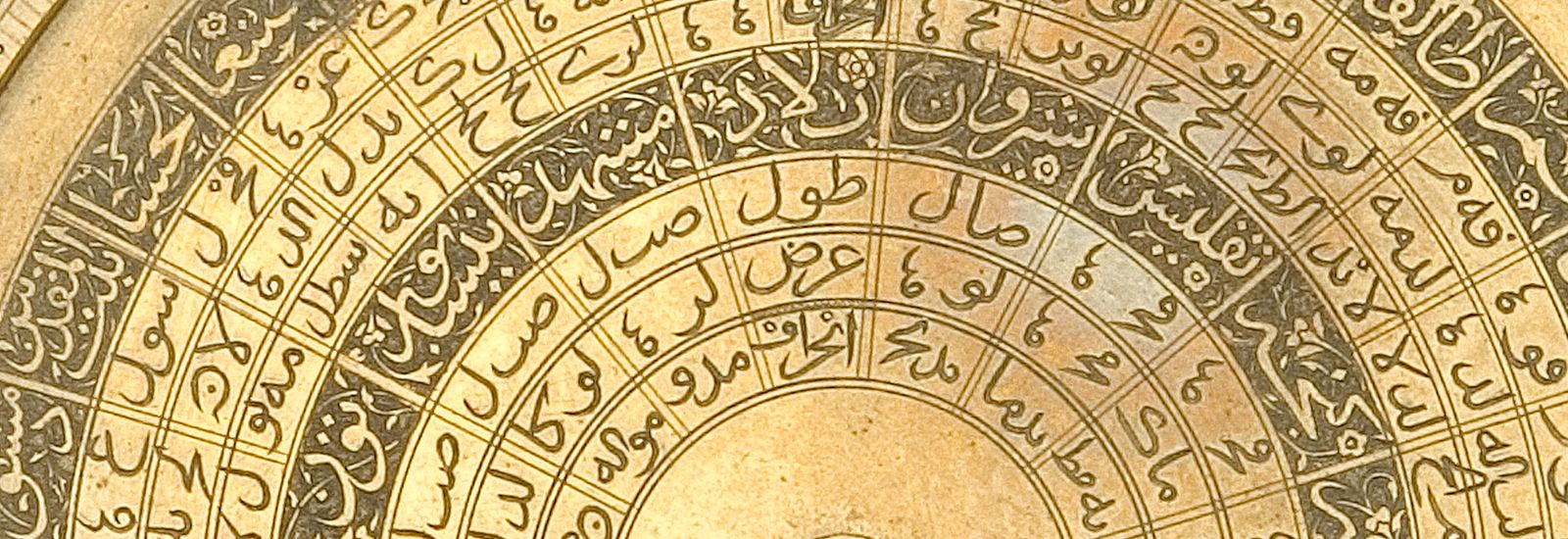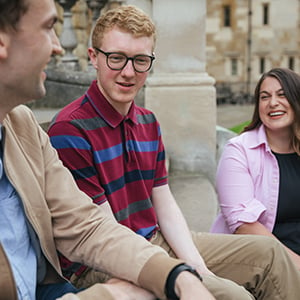
Religion and Asian and Middle Eastern Studies
Course overview
UCAS code: VT69
Entrance requirements: AAA
Course duration: 3 years (BA)
Subject requirements
Required subjects: Not applicable
Recommended subjects: Not applicable
Helpful subjects: A subject involving essay writing / a language
Other course requirements
Admissions tests: None
Written Work: One piece
Admissions statistics*
Interviewed: 44%
Successful: 20%
Intake: 2
Successful for a different course: 10%
Applicant intake for a different course: 1
*3-year average 2022-24
Theology and Religion contact
Email: access.undergraduate@theology.ox.ac.uk
Asian and Middle Eastern Studies contact
Tel: +44 (0) 1865 278312
Email: undergraduate.administrator@ames.ox.ac.uk
Unistats information for this course can be found at the bottom of the page
Please note that there may be no data available if the number of course participants is very small.
About the course
The course in Religion and Asian and Middle Eastern Studies offers students an in-depth understanding of one of a number of the world’s great religious traditions including Buddhism, Christianity, Hinduism, Islam and Judaism.
To engage with all the different aspects of the course, you will have to become something of a historian and a philosopher, a textual and literary critic, as well as an accomplished linguist. These disciplines together, not only enable students to appreciate the qualities of religions that can be radically different from those in Western societies, but also equip graduates with the analytical and critical abilities to embark on a wide range of careers.
Religion and Asian and Middle Eastern Studies enables students to study a major world religion through its primary texts in their original languages. It provides them with an understanding of the intellectual underpinning of religious traditions, and of the social and cultural contexts for religious beliefs and practices. Students can also explore topics such as the relationship between religions and science, and the place of religious ethics in public life.
Between them, the Faculties of Theology and Religion and Asian and Middle Eastern Studies include more than 270 academics, ranging from experts in the ancient languages and literature of the world’s religions to church historians and systematic theologians. The reputations of both faculties, together with Oxford’s excellent library facilities, attract scholars from all over the world.
 |  |  |
'[The course] is a rewarding subject if you like the combination of essay writing and language learning. You have the option to choose a broad range of topics offered by the Theology and Religion Faculty from history of early Christianity to mysticism to psychology of religion while the [Asian and Middle Eastern Studies] department provides you with a thorough learning of the religious language of your choice. For me, this is Sanskrit, for which I have five hours of tuition every week. I balance this with modules from Religion: Nature of religion and the Gospels and Jesus to name a few.' Puja-Arti | 'There’s a whole range of people with different faiths, beliefs, worldviews. That’s part of what makes it so exciting in tutorial - you don’t want to just hear people saying the same as you!' Chloe | 'The course can be as broad or as in depth as you like. You can really facilitate any of your interests. Whether you want to focus on the more traditional studies of the Bible or Church Doctrine, or whether you want to study World Religions your interests will be covered. Next year I will be able to study Feminist interpretation of religion alongside scatological humour in original Buddhist texts- almost everything is covered. There are so many amazing choices that I'm finding it difficult to choose!' Marcus |
Unistats information
Discover Uni course data provides applicants with Unistats statistics about undergraduate life at Oxford for a particular undergraduate course.
Please select 'see course data' to view the full Unistats data for Religion and Asian and Middle Eastern Studies.
Please note that there may be no data available if the number of course participants is very small.
Visit the Studying at Oxford section of this page for a more general insight into what studying here is likely to be like.
Religion and Asian and Middle Eastern Studies
A typical week
Your typical weekly timetable will be divided between one or two tutorials, which may take place at your college or at the college of a specialist tutor. Each week you will also attend up to six lectures. Throughout the course and especially in your first year, you will attend at least three (and often more) language classes each week. A large part of your week will be spent in independent study to prepare for language classes and for tutorials.
Tutorials usually involve two students and a tutor. Class sizes may vary depending on the options you choose or the language you are studying, but would normally have no more than around 10 students.
Most tutorials, classes, and lectures are delivered by academics who are specialists in their subject. Many are world-leading experts with years of experience in teaching and research. Some teaching may also be delivered by advanced postgraduate students.
Visit our Academic Year page to find out more about how our teaching year is structured.
Course structure
Year 1
Courses | Assessment |
|---|---|
|
First University examinations: four papers assessed by written and (depending on the option) oral examination. |
Years 2 and 3
Courses | Assessment |
|---|---|
Students take eight papers. Three papers must be selected from those taught by the Faculty of Theology and Religion and another three must be from those taught by the Faculty of Asian and Middle Eastern Studies. The remaining two papers may be in either subject. Students choose papers from a variety of subject areas offered by the Faculty of Theology and Religion, including:
For Asian and Middle Eastern Studies, students specialise in the study of one of the following religions, particularly through the study of its texts in their original languages:
Advanced language options are for candidates who have studied the same language for the Preliminary Examination. As one of their eight papers, all students must prepare a 12,000-word thesis on a topic of their choice in either Asian and Middle Eastern Studies or Theology and Religion. | Final University examinations: seven papers (assessed either by written examination or by submitted coursework, depending upon the option), plus a thesis |
The options listed in this section are illustrative and may change; not all languages are available every year.
More information about current options is available on the Faculty of Theology and Religion website and the Faculty of Asian and Middle Eastern Studies website.
The content and format of this course may change in some circumstances. Read further information about potential course changes.
Academic requirements
Qualification | Requirement |
|---|---|
A-levels: | AAA |
Advanced Highers: | AA/AAB |
International Baccalaureate (IB): | 38 (including core points) with 666 at HL |
Any other equivalent qualification: | View information on other UK qualifications, and international qualifications. |
Wherever possible, your grades are considered in the context in which they have been achieved.
Read further information on how we use contextual data.
Subject requirements
| Helpful: | Experience of studying a language, and a subject involving essay writing, to either A-level, Advanced Higher, Higher Level in the IB or another equivalent can be helpful to students in completing this course, although they are not required for admission. Students are not expected to have studied any of the languages on the course before. |
|---|
If a practical component forms part of any of your science A‐levels used to meet your offer, we expect you to pass it.
If English is not your first language you may also need to meet our English language requirements.
Applying
All candidates must follow the application procedure as shown on our Applying to Oxford pages.
The following information gives specific details for students applying for this course.
Admissions test
You do not need to take a written test as part of an application for this course.
Written work
| Description: | One piece written in English, which you have composed as part of a current or recent course of study, not exceeding 2,000 words in length (and shorter is fine). It should demonstrate your ability to:
Your work may be on any subject and not necessarily Language or Religion. There is no restriction as to the kind of work you may submit, providing it is your own work. You might choose to submit, for example, a mock A Level essay completed under examination conditions or a homework essay from your IB course. You should submit the work that you think best demonstrates the qualities outlined above. It is not usually necessary to write something especially for your application and if you have composed a suitable piece of work as part of a recent or ongoing course of study, you should submit it. However, if you do not have any recent, suitable written work available, tutors are pleased to accept a piece that has been written for submission. Read the further guidance available in the answers to FAQs on the Theology and Religion Faculty’s website. |
|---|---|
| Submission deadline: | 10 November 2025 |
Read our further guidance on the submission of written work for general guidance.
If you have any questions, please contact the college handling your application, or email the Faculty of Theology and Religion at access.undergraduate@theology.ox.ac.uk.
What are tutors looking for?
Tutors consider your whole application very carefully. They look for evidence of a consistently excellent academic record, for example in GCSE or other examination results.
Your submitted piece of work should demonstrate your ability to:
- think clearly and to reason coherently
- structure work and arguments in a logical way
- write clearly (and grammatically), with clear expression of thought
- provide evidence of independence of thought.
Your UCAS personal statement should focus on your academic reasons for wishing to study Religion and Asian and Middle Eastern Studies. References should comment primarily on academic performance.
Admissions tutors will be keen to find out about your linguistic aptitude and your commitment to a wide-ranging course. They will be looking for an ability to think clearly, form sound arguments and to listen and respond to counterarguments.
You may be asked to consider a sample language, a religious, philosophical or ethical question or to study a brief text or image, but whatever the subject of discussion, interviewers are interested in how you think and how you approach questions. Students are not expected to have prior knowledge of the subject or language.
Visit the Theology and Religion website and the Asian and Middle Eastern Studies website for more detail on the selection criteria for this course.
Careers
Oxford graduates in Religion and Asian and Middle Eastern Studies can expect to go on to careers as diverse as:
- the law
- social work
- the media
- journalism
- publishing
- banking
- management consultancy
- accountancy
- personnel management
- teaching
- the police force
- the arts.
Employers look very favourably on applicants who have learned languages and Oxford graduates with such skills are among the most successful each year in finding employment.
Visit the Theology and Religion Faculty website for more information about careers.
Note: These annual fees are for full-time students who begin this undergraduate course here in 2025. Course fee information for courses starting in 2026 will be updated in September.
We don't want anyone who has the academic ability to get a place to study here to be held back by their financial circumstances. To meet that aim, Oxford offers one of the most generous financial support packages available for UK students and this may be supplemented by support from your college.
Fees
Fee status | Annual Course fees |
| Home | £9,535 |
| Overseas | £41,130 |
Further details about fee status eligibility can be found on the fee status webpage.
For more information please refer to our course fees page. Fees will usually increase annually. For details, please see our guidance on likely increases to fees and charges.
Living costs
Living costs at Oxford might be less than you’d expect, as our world-class resources and college provision can help keep costs down.
Living costs for the academic year starting in 2025 are estimated to be between £1,425 and £2,035 for each month you are in Oxford. Our academic year is made up of three eight-week terms, so you would not usually need to be in Oxford for much more than six months of the year but may wish to budget over a nine-month period to ensure you also have sufficient funds during the holidays to meet essential costs. For further details please visit our living costs webpage.
Financial support
Home | A tuition fee loan is available from the UK government to cover course fees in full for Home (UK, Irish nationals and other eligible students with UK citizens' rights - see below*) students undertaking their first undergraduate degree**, so you don’t need to pay your course fees up front. In 2025 Oxford is offering one of the most generous bursary packages of any UK university to Home students with a family income of around £50,000 or less, with additional opportunities available to UK students from households with incomes of £32,500 or less. The UK government also provides living costs support to Home students from the UK and those with settled status who meet the residence requirements. *For courses starting on or after 1 August 2021, the UK government has confirmed that EU, other EEA, and Swiss Nationals will be eligible for student finance from the UK government if they have UK citizens’ rights (i.e. if they have pre-settled or settled status, or if they are an Irish citizen covered by the Common Travel Area arrangement). The support you can access from the government will depend on your residency status. |
Islands | Islands students are entitled to different support to that of students from the rest of the UK. Please refer the links below for information on the support to you available from your funding agency: |
Overseas | Please refer to the "Other Scholarships" section of our Oxford Bursaries and Scholarships page. |
**If you have studied at undergraduate level before and completed your course, you will be classed as an Equivalent or Lower Qualification student (ELQ) and won’t be eligible to receive government or Oxford funding
Additional Fees and Charges Information for Religion and Asian and Middle Eastern Studies
There are no compulsory costs for this course beyond the fees shown above and your living costs.
Contextual information
Unistats course data from Discover Uni provides applicants with statistics about a particular undergraduate course at Oxford. For a more holistic insight into what studying here is likely to be like, please view the information below and explore our website more widely.
The Oxford tutorial
College tutorials are central to teaching at Oxford. Typically, they take place in your college and are led by your academic tutor(s) who teach as well as do their own research. Students will also receive teaching in a variety of other ways, depending on the course. This will include lectures and classes, and may include laboratory work and fieldwork. However, tutorials offer a level of personalised attention from academic experts unavailable at most universities.
During tutorials (normally lasting an hour), college subject tutors will give you and one or two tutorial partners feedback on prepared work and cover a topic in depth. The other student(s) in your tutorials will typically be doing the same course as you and covering the same topic. Such regular and rigorous academic discussion develops and facilitates learning in a way that isn’t possible through lectures alone. Tutorials also allow for close progress monitoring so tutors can quickly provide additional support if necessary.
Read more about tutorials and an Oxford education
College life
Our colleges are at the heart of Oxford’s reputation as one of the best universities in the world.
- At Oxford, everyone is a member of a college as well as their subject department(s) and the University. Students therefore have both the benefits of belonging to a large, renowned institution and to a small and friendly academic community. Each college or hall is made up of academic and support staff, and students. Colleges provide a safe, supportive environment leaving you free to focus on your studies, enjoy time with friends and make the most of the huge variety of opportunities.
- Each college has a unique character, but generally their facilities are similar. Each one, large or small, will have the following essential facilities:
- Porters’ lodge (a staffed entrance and reception)
- Dining hall
- Lending library (often open 24/7 in term time)
- Student accommodation
- Tutors’ teaching rooms
- Chapel and/or music rooms
- Laundry
- Green spaces
- Common room (known as the JCR).
- All first-year students are offered college accommodation either on the main site of their college or in a nearby college annexe. This means that your neighbours will also be ‘freshers’ and new to life at Oxford. This accommodation is guaranteed, so you don’t need to worry about finding somewhere to live after accepting a place here, all of this is organised for you before you arrive.
- All colleges offer at least one further year of accommodation and some offer it for the entire duration of your degree. You may choose to take up the option to live in your college for the whole of your time at Oxford, or you might decide to arrange your own accommodation after your first year – perhaps because you want to live with friends from other colleges.
- While college academic tutors primarily support your academic development, you can also ask their advice on other things. Lots of other college staff including welfare officers help students settle in and are available to offer guidance on practical or health matters. Current students also actively support students in earlier years, sometimes as part of a college ‘family’ or as peer supporters trained by the University’s Counselling Service.
FIND OUT MORE
- Visit the Theology and Religion Faculty's website
- Visit the Faculty of Asian and Middle Eastern Studies' website (formerly the Faculty of Oriental Studies)

Our 2025 undergraduate Open Days will be held on 2 and 3 July and 19 September.
Register to find out more about our upcoming Open Days.
Top-ranked Department
Oxford's Faculty of Theology and Religion is the top ranked Theology, Divinity and Religious Studies Department in the UK and Europe and second in the world in the 2024 QS World University rankings, by subject.